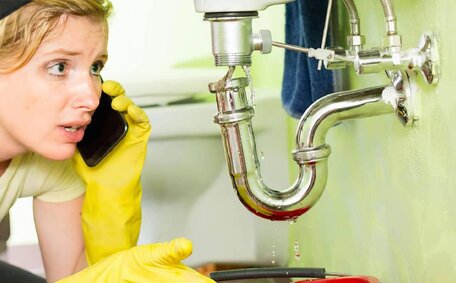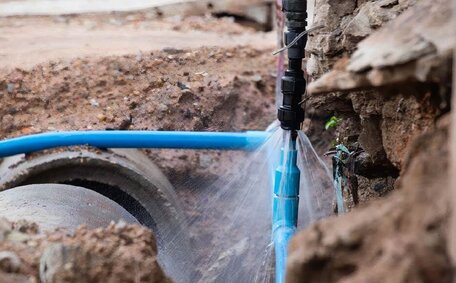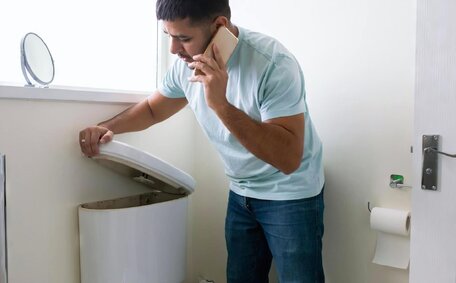What causes cloudy hot water?
Several factors, including temperature variations and pressure changes, can cause cloudy hot water.
- Air bubbles - Heating cold water causes dissolved gases to form air bubbles, which can make the water appear cloudy as they are released. Excess air released from heated water under pressure commonly causes this cloudiness, which usually clears after running the tap for a short time.
- Mineral deposits - Hard water with high mineral content like calcium and magnesium can lead to sediment buildup in pipes and the hot water system. This stirred-up sediment from the heater can cloud the water.
- Pressure changes - Variations in water pressure, particularly during a pressure relief valve’s activation in the water mains, can dislodge rust, scale and mineral deposits within pipes and the hot water heater, contaminating the water flow.
- Dissolved gases - Various gases such as oxygen, hydrogen sulphide, and methane can dissolve in water, often due to trapped air. These gases form bubbles when water is heated, leading to a milky appearance.
- Water heater issues - A malfunctioning hot water unit with a broken dip tube or faulty anode rod mixing hot and cold water may lead to cloudiness from temperature variances.
Usually, allowing the cloudy water to run from the tap for a few minutes clears the cloudiness. Despite its cloudy appearance, water with air bubbles and minerals is usually safe for consumption and other uses. If cloudiness or water quality concerns persist, it’s crucial to contact a plumber.
Persistent cloudiness may indicate sediment buildup in your hot water system, requiring further inspection.
Hard water and mineral deposits
Hard water, rich in minerals, can also cause cloudiness as it contains more air. Calcium and magnesium minerals can accumulate in pipes and appliances, leading to limescale deposits over time.
As hard water is heated, these mineral deposits get stirred up and suspended in the water flow, resulting in a milky cloudiness. Regions with high mineral content in their water supply commonly experience cloudy hot water.
Here are some strategies to address cloudy hot water caused by hard water:
- Scale buildup in water heaters can cause shower water to appear cloudy, as minerals release air bubbles upon heating. As limescale gets heated, it dislodges from the bottom up, reducing cloudiness gradually.
- Mineral deposits in pipes can release air bubbles when hot water dislodges sediment, resulting in a cloudy flow.
- Dissolved minerals can recrystallize upon cooling, and repeated heating may cause these to cloud the hot water flow.
- Corroding old galvanised pipes can leach iron sediment into the water, causing cloudiness when hot water flows.
To fix cloudy water from your hot tap when faced with hard water issues, consider protective measures for your hot water heater like installing a water softener or scale inhibitor. This process exchanges the minerals in the water for sodium or potassium ions. A water softener will protect your plumbing and fixtures from scale buildup.
Installing activated carbon or reverse osmosis filters on your tap can also mitigate cloudy water by filtering sediment just before use. Upgrading old pipes and your water heater can help maintain water quality by reducing corrosion and mineral build-up.
The temporary cloudiness in your water from hard water minerals is usually harmless, despite its unappealing look. A plumber should inspect your system for safety and address any issues if the cloudiness remains.
When to call a professional plumber
Most often, cloudy water is harmless and will clear itself after running the taps for a short period. In certain cases, it’s best to seek a professional plumber’s help to diagnose and resolve unclear water causes:
- If the water remains cloudy after running the faucet for several minutes, further investigation may be needed to identify underlying problems.
- Burst pipe - Visible sediment or particles in your cloudy water may indicate corroded pipes or a problem with your hot water system needing repair.
- Rotten egg smell - A sulphur or rotten egg odour can signify harmful bacteria or gas buildup requiring disinfection.
- Rust-coloured water suggests that there may be corrosion in the pipes or that the heater may require replacement.
- Cloudy water combined with a lack of hot water signifies a serious issue that requires a plumber’s expertise.
- Other plumbing issues - Cloudiness along with changes in water pressure, leaks or abnormal noises indicates larger problems.
- Safety concerns - At any sign the water could be unsafe, unhealthy or contaminated, contact a professional immediately.
Licensed plumbers can assess your water system and identify the cause of persistent cloudiness. We can perform water testing if contamination is suspected, and offer solutions like flushing, descaling, water treatment, repairs or full system replacements as needed to restore hot water quality.
For professional service and comprehensive assessments of cloudy water concerns, contact Northmead Plumbing.






